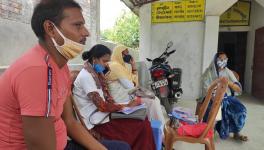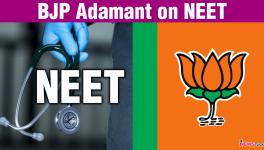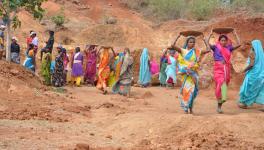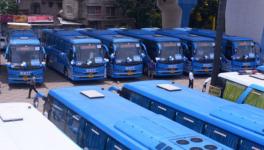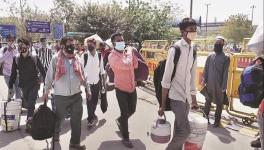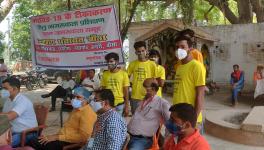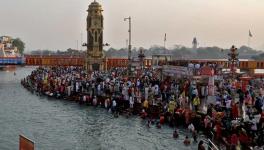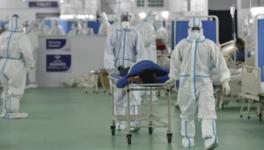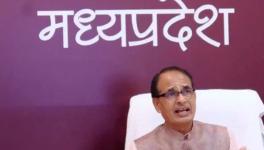COVID-19: Does India Need an Immediate Lockdown?
The second wave of COVID-19 continues ravage India. Each passing day, the country is witnessing record numbers of cases and deaths being registered. The latest tally says that over 4.14 lakh new cases and 3,915 deaths were reported in the last 24 hours.
Meanwhile, the healthcare system is nowhere near tackling the unprecedented crisis and with the continuing surge the cannot be expected to improve any time soon. The question then arises as to what can be done to arrest this crisis which is engulfing the country.
An immediate nationwide lockdown has been advocated by many. Congress leader Rahul Gandhi recently talked about it, many medical experts and even a few Supreme Court judges have advised the central government to impose a lockdown with an immediate effect. However, the question remains—will that be helpful in mitigating the situation?
Commenting on this, Prof. Giridhar R Babu, who heads the epidemiology section of the Public Health Foundation of India (PHFI), told NewsClick over phone that a countrywide lockdown will not be of much help at this time. However, he emphasised that, in the nearly 200 districts, where case positivity rate (fraction of people positive among those tested) is very high as per government data, strict containment should be taken up. Thus, he focused on a clustered or region-based lockdown rather a nationwide one, like last year.
Prof. Babu further said that increasing the bed capacity in hospitals across the country should be of utmost priority, especially when 60% of the critical care units are already saturated. He reiterated what the Lancet COVID-19 Commission India Task Force has suggested, that no blanket lockdown, but strict restriction on gatherings beyond 10 people needs to be continued. Babu is also a part of the task force.
Talking about the possibility of a third wave and the measures that have to be prioritised immediately by the government to tackle the future waves, he said that the crowd containing measures should continue for an extended period. He also said that the “testing, tracking, isolating” process must be scaled up and continued. Expanding the speed and coverage of vaccination is vital to reduce the mortality in the case of any future waves, he pointed out.
Prof. Gagandeep Kang, leading immunologist of the country belonging to CMC Vellore, said that If a lockdown is planned, it should be i) with a warning so people know what to expect, ii) with arrangements for food and shelter for the most vulnerable and iii) with consideration of immediate compensation for lack of employment for all in the informal sector.
The lockdown should only be used as a holding tool, and not a solution. It should be to decrease cases and decrease the spread of infection. The lockdown must be used to build health infrastructure and expand vaccination.
Prof. Kang also favours a cluster or region-based approach, however, if it fails then only we need to go for a nationwide lockdown, but “again with the real and timely support to the most vulnerable”—she reiterates.
Sachin Kumar, an Associate Professor at IIT (Indian Institute of Technology), Guwahati, and a virologist also held a similar view. Talking about the lockdown, he told NewsClick, “I don't think that a complete lockdown is a necessity but will help to mitigate the effect. However, I support a complete lockdown of the places where there is any possibility of gathering/ closed space (theatres, malls, restaurants etc.). To maintain their livelihood the online mode of business must be preferred.”
Also Read: Over 7.5 Million Jobs Lost in April: Experts Call for Fresh Relief Package for Marginalised
However, he strongly supported lockdown in the big metropolitan cities. “Because the problem in small towns can be controlled by night curfew or putting some additional guidelines in the daytime,” he added.
Kumar also highlighted other aspects that are being ignored during this crisis period. He said that at present, people are not paying attention to non-COVID related health issues. “If a person has been infected let it be treated symptomatically like other viral diseases. Many deaths are being caused by improper treatment and anxiety related complications rather than the virus,” he added.
“Government should work towards revising the overall medical practices in India. There are many parameters to it, such as fixing the rate of diagnostic tests, keeping a maximum cap for the treatment expenditure, treatment charges etc. in the private hospitals,” he further suggested.
Prof. Satyajit Rath, noted immunologist and adjunct faculty of IISER (Indian Institute of Science Education and Research), Pune, also showed apprehensions about a nationwide lockdown, which may have “insurmountable cost”.
On being asked about the lockdown, he raised several questions. He said, “Is a 'hard' (meaning 'complete') nationwide lockdown of, say, two or three weeks, likely to make a major difference in lowering the rates of virus transmission? Yes. Will it ease, over the very short, immediate term, the currently intolerable pressure on our pitifully inadequate critical care medical facilities and the people who are heroically running them? Yes. Will it therefore likely save the lives of some severely ill COVID-19 patients in the near future? Yes.”
“On the other hand,” he added, “Will a lockdown be without major additional human cost? No. Will that cost be, to put it callously, be lower than the 'savings' from a lockdown? I don't know; I don't even know how to make such a calculation about human lives.”
Rath also said that there are indications that the current outbreak across the country will begin to decline even without a nationwide total lockdown. However, the question that remains, according to him is whether the decline would arrive at a level that the country’s catastrophically overworked critical medical care facilities and their staff can bear for a while.
Further he highlighted that there is no assurance about the government undertaking immediate steps to alleviate the suffering that will be caused by such a harsh lockdown. He also questioned whether the government would utilise the respite provided by such a lockdown to invest, rapidly and systematically, in durable enhancement of public health care systems. “They are our only real instruments to deal with the pandemic, from community health care to critical medical care,” he said, adding, that past experiences and present attitude of the government indicated otherwise.
“Would it be good to have a strict three-week lockdown in which the Union government provides immediate extensive credible support, of both cash and kind, for endangered marginal livelihoods and lives, and, on a 'war footing', enhances the scale and reliability of virus testing and sequencing, improves the vaccine supply and campaign implementation, and invests rapidly in community outreach health teams as well as in critical care facilities in all the ways that they require? Yes. How much of a pipe dream is such a scenario?,” he said, expressing concern over the government’s current attitude towards the pandemic.
Get the latest reports & analysis with people's perspective on Protests, movements & deep analytical videos, discussions of the current affairs in your Telegram app. Subscribe to NewsClick's Telegram channel & get Real-Time updates on stories, as they get published on our website.










